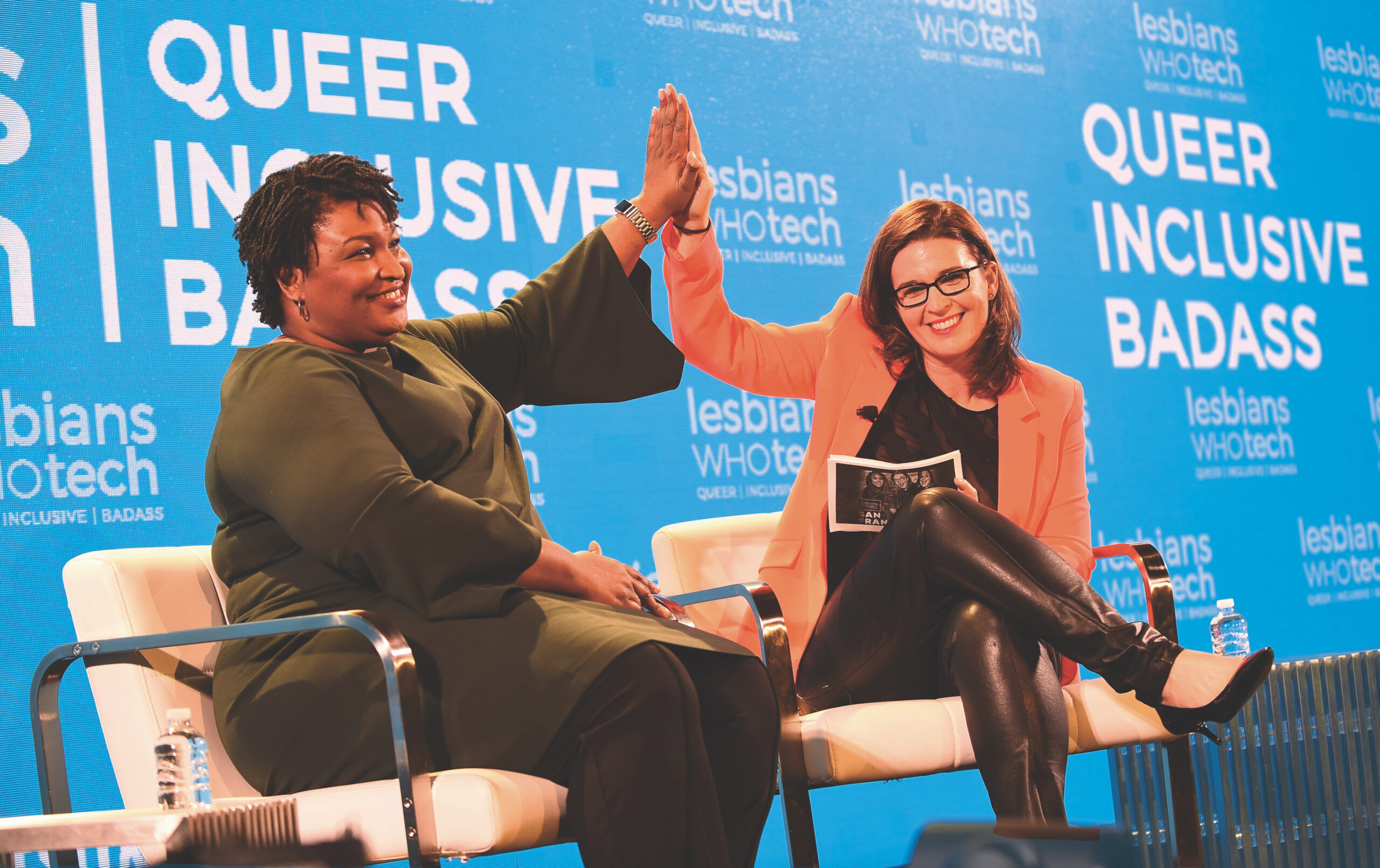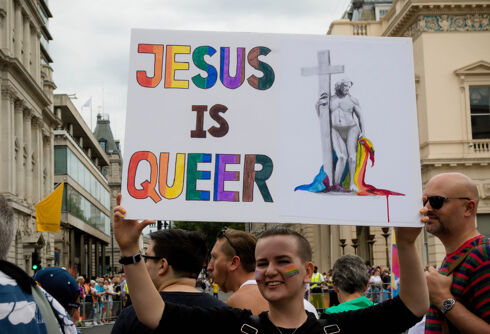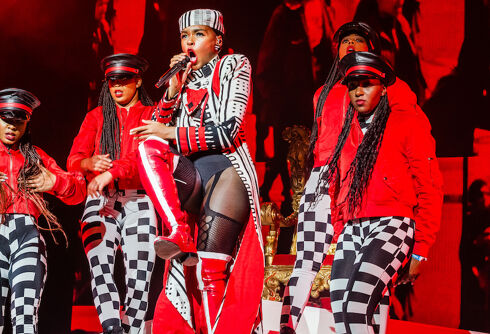If you ask Leanne Pittsford, diversity, equity, and inclusion (DEI) in STEM are intrinsically linked to thoughtful innovation. The San Francisco-based technologist and entrepreneur is the founder and CEO of Lesbians Who Tech & Allies (LWT), a first-of-its-kind organization that empowers queer women and trans technologists.
With the sudden ubiquity of artificial intelligence (AI) programs like ChatGPT, the tech sector is one of the most buzzworthy areas in STEM. However, despite increased pushes for DEI, the field is still overwhelmingly white and male. Women account for just 28 percent of all STEM professionals, and queer women are even more underrepresented. They’re rarely promoted to senior roles or recognized as leaders in their fields.
Related:
The gay man behind Chat GPT says AI could revolutionize the world but could also destroy it
He said his greatest concern is the ability of AI to provide “one-on-one interactive disinformation.”
Thanks to the work of industry pioneers like Pittsford, the tide is beginning to change — and that’s a boon to both queer individuals and technological innovation at large.
But these advancements don’t occur in a vacuum. In the past year alone, AI technology has progressed so rapidly that government agencies worldwide struggle to regulate it. Although these technologies may seem inherently objective, they are still used by humans who harbor their own subjectivities and social biases. The software engineers who develop AI chatbots and algorithms are biased, too — and they’re being confronted daily with the social and political ramifications of inadvertently scaling their own prejudices.
According to Pittsford, 42, that’s precisely why we need diverse thinkers in this field. Technologists from historically marginalized communities tend to approach their work with inclusion and equity in mind, which bodes well for the future of AI and other emerging technologies.
Never Miss a Beat
Subscribe to our newsletter to stay ahead of the latest LGBTQ+ political news and insights.
‘We see diverse representation as a skill.’

“We see diverse representation as a skill,” Pittsford told LGBTQ Nation. “Our lived experience shapes us, and thinking outside the box is something that people from communities that don’t have power or privilege have to do all the time to survive.”
Pittsford has seen this phenomenon play out in her own career. Before launching LWT, she landed a job as a development and database manager at Equality California, a statewide advocacy group. At the time, the organization was raising money to fund its campaign against Prop 8, a 2008 ballot proposition intended to ban marriage equality in the Golden State.
Given the subject matter, Pittsford proposed creating an online fundraising tool in the style of a wedding registry. “I was the first person to come out with that idea,” she said. “Instead of getting [a couple] a toaster, you could show support and make sure that your family and friends got to keep their right to marry.”
Pittsford used front-end web development skills and “out-of-the-box solutions” to actualize her inventive idea. The fundraiser was so effective it was later emulated by the Human Rights Campaign (HRC).
Equality California ultimately lost its fight against Prop 8, but the campaign inspired Pittsford. “It was the first time I fell in love with the power of technology,” she recalled.
It also served as an eye-opening reminder of pervasive financial inequities for women. Pittsford rarely encountered other queer women at Equality California’s events. Most of the organization’s financial supporters were men. When women donated, they gave significantly less. “To me, that highlights the bigger economic story: Women still make less than men,” she said.
According to Pittsford, these gaps in visibility and pay are especially wide in the tech sector. Even when tech companies prioritize recruiting and empowering women employees, they often lump queer women in with the broader LGBTQ+ community, obscuring the nuanced experiences of queer women, who are dually impacted by sexism and homophobia.
“Because of that, queer women in tech essentially get left out of the conversation,” Pittsford added. “We rarely have a seat at the table.”
“Our lived experience shapes us, and thinking outside the box is something that people from communities that don’t have power or privilege have to do all the time to survive.”
Leanne Pittsford
These disparities aren’t just harmful to queer people; they’re also detrimental to innovation. Dr. Erin A. Cech, a sociologist and associate professor at the University of Michigan, studies systemic inequalities in STEM. Her research has determined that LGBTQ+ STEM professionals are more likely to encounter social exclusion, professional devaluation, and career limitations than their straight peers and, thus, more likely to leave these industries.
At the same time, multiple studies have shown that diverse groups of problem-solvers generate more creative and productive solutions because they offer perspectives beyond the purview of the mainstream.
“If our goal is to solve complex societal problems, we need as many different ways of thinking about these issues as we can get,” Cech told LGBTQ Nation. “Artificially limiting that spectrum of experiences and perspectives because of societal value systems just diminishes the ways we can innovate.”
It’s one of the many reasons Pittsford has dedicated her career to increasing visibility and economic power for queer women and trans technologists.
“I believe that if we had more queer women, women of color, and trans leaders…the world would be a much better place,” she added.
Pittsford founded LWT in 2013. At the time, she was still reeling from the death of her brother, a lifelong techie who was learning Javascript when he passed away. She received life insurance money after his passing and felt a responsibility to “do something powerful” with the financial safety net she now had.
In its first year alone, LWT amassed a following of 4,000 people. There was clearly interest in Pittsford’s mission, so she continued to experiment with events. LWT held its first summit in 2014, which attracted nearly 800 queer attendees. Its success prompted Pittsford to launch an Indiegogo fundraiser for pre-sale tickets to a potential New York summit. In just five days, LWT met its goal of $20,000.
In a decade of operation, LWT has become the world’s largest community for LGBTQ+ people in tech, solidifying Pittsford’s place as an industry leader. Its community is more than 40,000 members strong; its annual San Francisco Summit, which will occur virtually and in person this October, welcomes 5,000 attendees yearly.
To mitigate financial barriers, LWT keeps its ticket prices below industry standards. Pittsford’s team is also unusually transparent about their speaker selection process. They avoid tokenization by prioritizing diversity and business innovation in equal measure.
“If you looked at the list of topics and didn’t see who was speaking, you’d be like, ‘This is South by Southwest,’” Pittsford explained. “We’re a tech innovation conference. Sure, we have Stacy Abrams, but over 50 percent of our content is engineering.”
Summit attendees are afforded the rare opportunity to network with other queer women and trans technologists, which can result in life-changing professional opportunities. Megan Smith, an award-winning engineer and LWT member, is a prime example. In 2014, LWT partnered with the Obama administration to organize the first-ever LGBT Tech and Innovation Summit at the White House. Pittsford tapped Smith, a VP at Google at the time, as a speaker.
“That event is where she got recruited to be the first woman Chief Technology Officer and the first queer woman CTO of the United States,” Pittsford said. “It’s one of my favorite stories about the power of the community. When people invest [in queer communities], they get diverse representation — and a great CTO for the country.”
“To create access, you have to change the parameters of how the industry has always done things.”
Leanne Pittsford
Another pillar of Pittsford’s work with LWT is providing professional development opportunities for members. In 2017, the company launched the Edie Windsor Coding Scholarship in collaboration with the late marriage equality activist and IBM engineer. The program covers half the boot camp tuition for an LGBTQ+ woman or nonbinary person to learn how to code.
Alums of the program have gone on to become software engineers and data coordinators at top companies like IBM, AirBnb, and Assurant. Their successes epitomize how knowledge and capital can completely transform the lives of queer women technologists.
‘There’s a pipeline. There’s just no access.’
Earlier this year, LWT launched Squad, a leadership program for mid-level queer women and trans technologists. According to Pittsford, the project has been in development for “about six years” and addresses persistent diversity gaps in more senior tech roles. A 2022 report from McKinsey found that just 52 women at tech companies are promoted to manager for every 100 men.
Promotions like this can significantly increase a marginalized technologist’s economic and institutional power — and the more empowered they are, the better they can innovate. It’s no wonder that, at the time of writing, more than 1,000 people have already applied to the program.
Squad itself exemplifies Pittsford’s innovative thinking. She and her team are exploring ways to open doors in tech by “changing paradigms” within the industry. For instance, many tech companies require that senior-level employees have computer science degrees from four-year universities. Pittsford explained that the requirement could be prohibitive for technologists who are otherwise qualified but learned how to code at more affordable boot camps.
“Whether you’re talking about executives or junior-level talent, this idea that there’s no pipeline [for success in tech] is not true. There is a pipeline; there’s just no access,” she added. “And to create access, you have to change the parameters of how the industry has always done things.”















